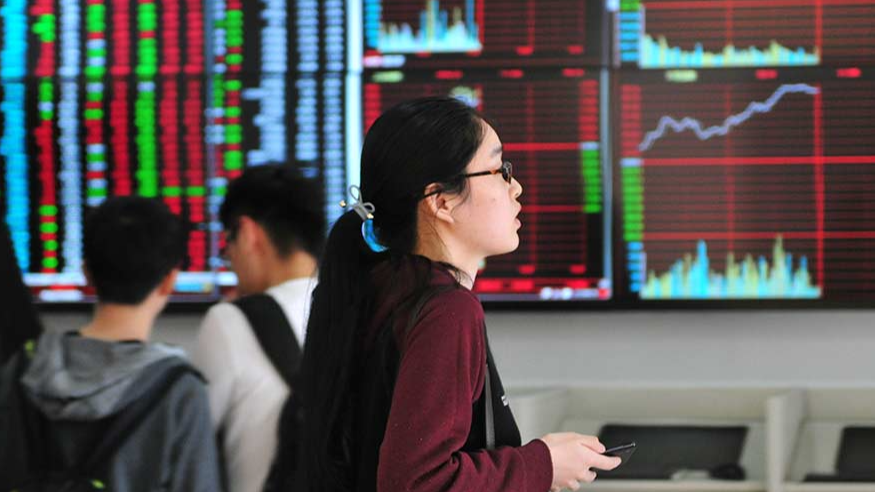Institutional investors' long-term capital seen backing modernization

China's A-share market will further stabilize as long-term institutional investors inject more capital amid policymakers' support for their role in the capital market, said experts.
At a recent forum on deepening capital market reform, Wu Qing, chairman of the China Securities Regulatory Commission, the country's top securities watchdog, said that institutional investors should make continued efforts to improve their investment and research capabilities, growing into stronger buyers in the A-share market.
READ MORE: Better financial regulatory system urged
In this way, investors can likely obtain reasonable returns, with their confidence and trust in the market elevated. Institutional investors can better play their role as market stabilizers and economic growth drivers, said Wu.
The forum was attended by prominent institutional investors such as social security funds, insurance firms' asset management firms, banks' asset management arms and private equity firms.
As China enters the pivotal phase of its high-quality economic development, people's need for asset allocation, wealth management and investment products to prepare for their twilight years has risen, alongside the increasing demand for long-term equity investment, according to the forum participants.
So, more favorable accounting and tax mechanisms are needed to attract more long-term capital, they suggested. Basic infrastructure should be further completed to encourage IPOs of high-tech enterprises and companies specializing in new quality productive forces, they said.
At the forum, Wu stressed that the construction of a policy system focused on long-term investment should be promoted. Financing and investment, the two major functions of the capital market, should be coordinated to better serve China's modernization, he said.
It is the second forum that the CSRC has held within a month. In the first one in late July, the CSRC discussed with foreign securities firms and qualified foreign institutional investors hot topics like A-share companies' mergers and acquisition.
Lian Ping, president of the China Chief Economist Forum, suggested that China's stress on long-term capital can further increase foreign firms' holdings of equity assets. More long-term foreign capital may flow into China as yuan-denominated assets' investment value has become increasingly noticeable amid China's economic recovery that has been stabilizing and the prospect of US Federal Reserve's interest rate cuts.
Jiang Guangming, senior deputy general manager of Huatai Asset Management, said that sources of China's long-term capital can be further enriched as pension and insurance funds are still the two major capital contributors. In overseas markets, insurance funds, pensions, charitable donations, companies' annuities and family funds are all constituents of long-term capital, he said.
The benchmark Shanghai Composite Index rose a tad to 2,855.52 points on Monday while the Shenzhen Component Index gained 0.16 percent.
Meng Lei, China equity strategist of UBS Securities, said that exchange-traded funds and insurance capital have made up the bulk of incremental capital for the A-share market so far this year.
According to Shanghai-based market tracker Wind Info, stock-based ETFs received a net capital inflow of over 35 billion yuan ($4.9 billion) during the past trading week ended Friday. More than 500 billion yuan has flowed into ETFs so far this year.
But unlike mutual funds, such capital inflows have been slow. So, their impact on A share valuations will also manifest slowly, mainly driven by improvements in company fundamentals and profitability. The indexes' rebound, which will likely be moderate, is expected in the second half of the year, said Meng.
ETFs and insurance capital enjoy special preference over companies generating higher dividends. So, individual investors should take a closer look at such companies, he said.
ALSO READ: Reform seen aiding stock market's long-term development, stability
Agreed Chen Gang, chief strategist of Soochow Securities. Large-scale capital inflows into index-based ETFs have become a major trend in the A-share market, he said.
But during the previous market adjustment, some companies' share prices fell unreasonably, given their strong fundamentals. So, companies with positive growth and improving profitability in the medium to long run, may see their share prices corrected soon, he said.
Meanwhile, US Fed Chair Jerome Powell has sent a clearer dovish signal during the Jackson Hole meeting on Friday, indicating "the time has come" for interest rate cuts, Chen said.
Tech-driven growth enterprises listed in the A-share market may thus benefit from any interest rate cuts in the US, Chen said, citing artificial intelligence, low-altitude economy and semiconductor companies as examples.


